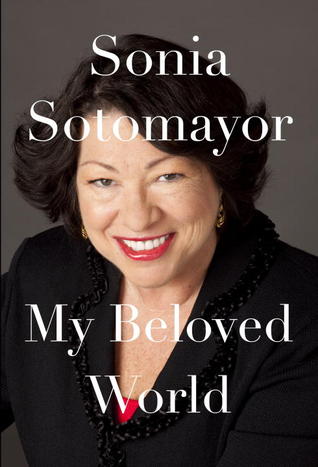 My Beloved World, by Sonia Sotomayor
My Beloved World, by Sonia Sotomayor
What a phenomenal woman! I never would have guessed that someone so accomplished--reaching the top rung of her field at a fairly young age--would start her life with such large obstacles. She had an alcoholic father, was raised by a hard-working single mother in poverty, and continues to struggle from anxiety. In this memoir, she opens up and shares her stories from a young age...from when she was first diagnosed with juvenile diabetes and had to start giving herself daily injections...to talking about how her marriage failed. She decided to write a book because "People who live in difficult circumstances need to know that happy endings are possible."
She revealed more about herself than typical for a Supreme Court justice and knew she might be judged harshly for some of her choices, but she made this decision consciously to offer comfort, and maybe inspiration, by showing that an "ordinary person, with strengths and weaknesses like anyone else, has managed an extraordinary journey."
From an early age, she chafed against injustice...beginning with Catholic school, where she reflected that "I accepted what the Sisters taught in religion class: that God is loving, merciful, charitable, forgiving. That message didn't jibe with adults smacking kids." The nuns also criticized working mothers, which angered Sotomayor because her own mother worked long hours in a couple of jobs to send Sonia and her brother to that private school. This passion for justice fed her desire to become a judge, and after she became a judge she dreamed of becoming a Supreme Court justice.
Even though she has accomplished amazing things in life, she has not done it without carrying along a load of doubts. From her school days well into her professional career, she wrote about settling into new places or positions before jumping in with both feet. In college, she didn't want to join a club in her first year until she had gotten the lay of the land.
I love Sotomayor's views on mentors and friends: "Whenever I make a new friend, my mind goes naturally to the question, what can I learn from this person? There are very few people in the world whom you can't learn something from, but even rarer are those souls who can reveal whole worlds to you if you observe them carefully." From her far-flung Dominican family from childhood, to her current family of close friends and relatives, Sotomayor highly values close relationships with others. Although she never had children, she has a special affinity for them and has close bonds with countless godchildren. She has a special relationship with her niece was an early preemie.
Living with diabetes her whole life has given Sotomayor a wise, deep appreciation for life:
"I've lived most of my life inescapably aware that it is precious and finite. The reality of diabetes always lurked in the back of my mind, and early on I accepted the probably that I would die young. There was no point fretting about it; I have never worried about what I can't control. But nor could I waste what time I had; some inner metronome has continued to set a beat I am unable to refuse. Now diabetes has become more manageable, and I no longer fear falling short in the tally of years. But the habit of living as if in the shadow of death has remained with me, and I consider that, too a gift."
I share her philosophy of every experience containing a lesson or a blessing:
"With every friend I've known, in every situation I've encountered, I have found something to learn. From a task as simple as boiling water, you can learn a worthwhile lesson. There is no experience that can't avail something useful, be it only the discipline to manage adversity. With luck, there will be plenty of time ahead for me to continue growing and learning, many more stories to tell before I can begin to say definitively who I am as a judge."
Although I had a hard time sinking into this memoir at first, it was well worth the effort!
 Word Nerd, by Susan Nielsen
Word Nerd, by Susan Nielsen
